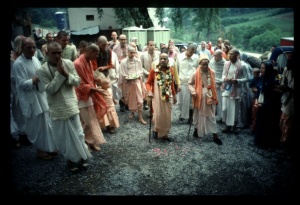CC Adi 17.304 (1975): Difference between revisions
(Vanibot #0027: CCMirror - Mirror CC's 1996 edition to form a basis for 1975) |
(Vanibot #0020: VersionCompareLinker - added a link to the Version Compare feature) |
||
| Line 2: | Line 2: | ||
<div style="float:left">'''[[Sri Caitanya-caritamrta (1975)|Śrī Caitanya-caritāmṛta (1975)]] - [[CC Adi (1975)|Ādi-līlā]] - [[CC Adi 17 (1975)|Chapter 17: The Pastimes of Lord Caitanya Mahāprabhu in His Youth]]'''</div> | <div style="float:left">'''[[Sri Caitanya-caritamrta (1975)|Śrī Caitanya-caritāmṛta (1975)]] - [[CC Adi (1975)|Ādi-līlā]] - [[CC Adi 17 (1975)|Chapter 17: The Pastimes of Lord Caitanya Mahāprabhu in His Youth]]'''</div> | ||
<div style="float:right">[[File:Go-previous.png|link=CC Adi 17.303 (1975)|Ādi-līlā 17.303]] '''[[CC Adi 17.303 (1975)|Ādi-līlā 17.303]] - [[CC Adi 17.305 (1975)|Ādi-līlā 17.305]]''' [[File:Go-next.png|link=CC Adi 17.305 (1975)|Ādi-līlā 17.305]]</div> | <div style="float:right">[[File:Go-previous.png|link=CC Adi 17.303 (1975)|Ādi-līlā 17.303]] '''[[CC Adi 17.303 (1975)|Ādi-līlā 17.303]] - [[CC Adi 17.305 (1975)|Ādi-līlā 17.305]]''' [[File:Go-next.png|link=CC Adi 17.305 (1975)|Ādi-līlā 17.305]]</div> | ||
{{CompareVersions|CC|Adi 17.304|CC 1975|CC 1996}} | |||
{{RandomImage}} | {{RandomImage}} | ||
==== TEXT 304 ==== | ==== TEXT 304 ==== | ||
<div class="verse"> | <div class="verse"> | ||
:sei kṛṣṇa, sei gopī, | :sei kṛṣṇa, sei gopī,--parama virodha | ||
:acintya caritra prabhura ati sudurbodha | :acintya caritra prabhura ati sudurbodha | ||
</div> | </div> | ||
| Line 18: | Line 17: | ||
<div class="synonyms"> | <div class="synonyms"> | ||
sei kṛṣṇa—that Kṛṣṇa; sei gopī—that gopī; parama virodha—very contradictory; acintya—inconceivable; caritra—character; prabhura—of the Lord; ati—very; sudurbodha—difficult to understand. | sei kṛṣṇa—that Kṛṣṇa; sei gopī—that gopī; parama virodha—very much contradictory; acintya—inconceivable; caritra—character; prabhura—of the Lord; ati—very much; sudurbodha—difficult to understand. | ||
</div> | </div> | ||
| Line 32: | Line 31: | ||
<div class="purport"> | <div class="purport"> | ||
Kṛṣṇa's accepting the part of the gopīs is certainly contradictory according to any mundane calculations, but the Lord, by His inconceivable character, may act like the gopīs and feel separation from Kṛṣṇa, although He is Kṛṣṇa Himself. Such a contradiction can be reconciled only in the Supreme Personality of Godhead because He has energy that is inconceivable (acintya), which can make possible that which is impossible to do (aghaṭa-ghaṭana-patīyasī). Such contradictions are very difficult to understand unless a devotee strictly follows the Vaiṣṇava philosophy under the direction of the Gosvāmīs. Therefore Kṛṣṇadāsa Kavirāja Gosvāmī ends every chapter with this verse: | |||
śrī-rūpa-raghunātha-pade yāra āśa | |||
caitanya-caritāmṛta kahe kṛṣṇadāsa | |||
"Praying at the lotus feet of Śrī Rūpa and Śrī Raghunātha, always desiring their mercy, I, Kṛṣṇadāsa, narrate Śrī Caitanya-caritāmṛta, following in their footsteps." | |||
In a song by Narottama dāsa Ṭhākura it is stated: | In a song by Narottama dāsa Ṭhākura it is stated: | ||
Latest revision as of 16:33, 26 January 2020

A.C. Bhaktivedanta Swami Prabhupada
TEXT 304
- sei kṛṣṇa, sei gopī,--parama virodha
- acintya caritra prabhura ati sudurbodha
SYNONYMS
sei kṛṣṇa—that Kṛṣṇa; sei gopī—that gopī; parama virodha—very much contradictory; acintya—inconceivable; caritra—character; prabhura—of the Lord; ati—very much; sudurbodha—difficult to understand.
TRANSLATION
He is Kṛṣṇa, yet He has accepted the mood of the gopīs. How is it so? It is the inconceivable character of the Lord, which is very difficult to understand.
PURPORT
Kṛṣṇa's accepting the part of the gopīs is certainly contradictory according to any mundane calculations, but the Lord, by His inconceivable character, may act like the gopīs and feel separation from Kṛṣṇa, although He is Kṛṣṇa Himself. Such a contradiction can be reconciled only in the Supreme Personality of Godhead because He has energy that is inconceivable (acintya), which can make possible that which is impossible to do (aghaṭa-ghaṭana-patīyasī). Such contradictions are very difficult to understand unless a devotee strictly follows the Vaiṣṇava philosophy under the direction of the Gosvāmīs. Therefore Kṛṣṇadāsa Kavirāja Gosvāmī ends every chapter with this verse:
śrī-rūpa-raghunātha-pade yāra āśa
caitanya-caritāmṛta kahe kṛṣṇadāsa
"Praying at the lotus feet of Śrī Rūpa and Śrī Raghunātha, always desiring their mercy, I, Kṛṣṇadāsa, narrate Śrī Caitanya-caritāmṛta, following in their footsteps."
In a song by Narottama dāsa Ṭhākura it is stated:
- rūpa-raghunātha-pade ha-ibe ākuti
- kabe hāma bujhaba se yugala-pīriti
The conjugal love between Rādhā and Kṛṣṇa, which is called yugala-pīriti, is not understandable by mundane scholars, artists or poets. It is simply to be understood by devotees who strictly follow in the footsteps of the six Gosvāmīs. Sometimes so-called artists and poets try to understand the love affairs of Rādhā and Kṛṣṇa, and they publish cheap books of poetry and pictures on the subject. Unfortunately, however, they do not understand the transcendental affairs of Rādhā and Kṛṣṇa even to the smallest degree. They are simply meddling in a matter in which they are not fit even to enter.